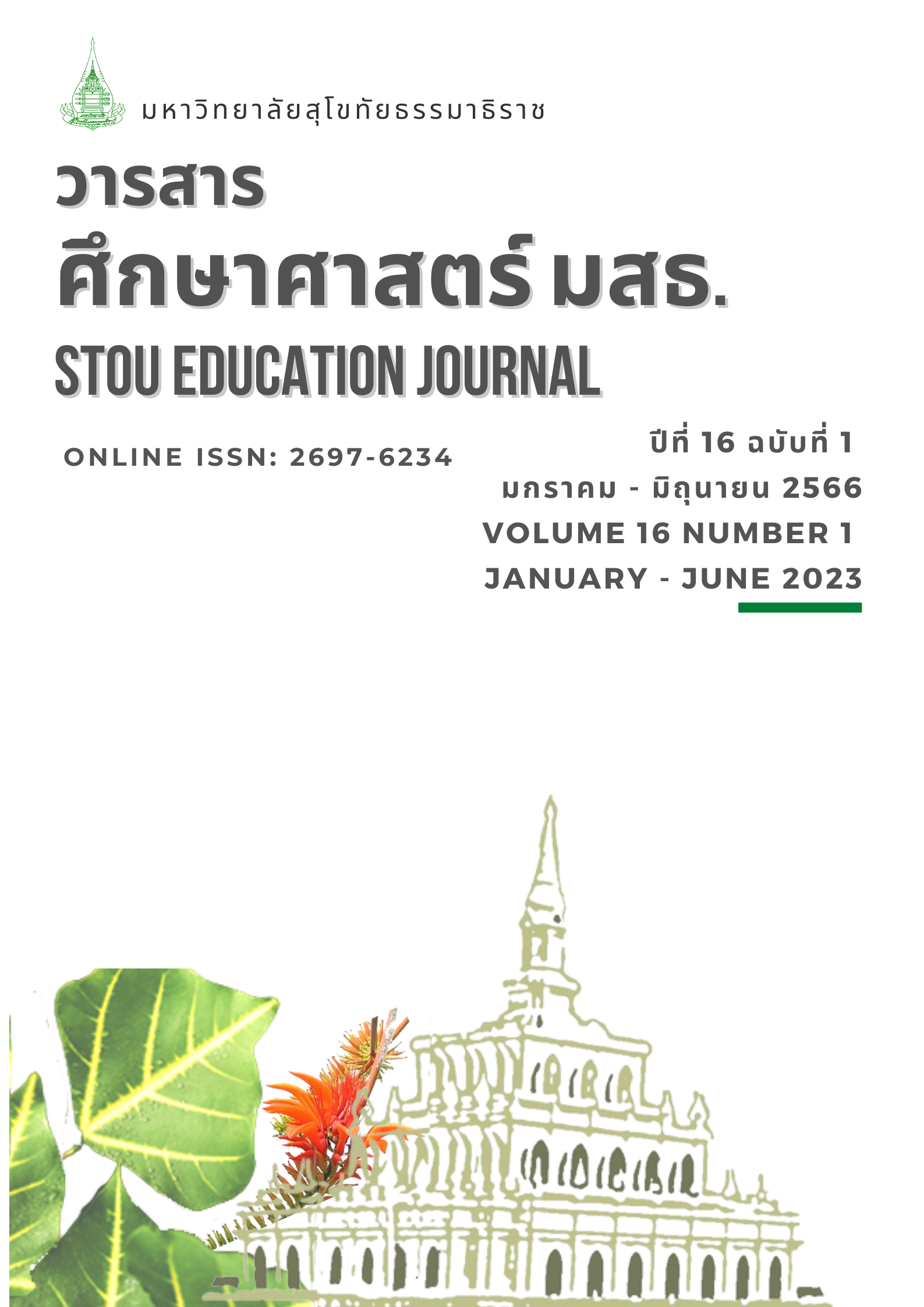Effects of Group Dynamics Activities Integrating with Islamic Principles on Enhancing Positive Psychological Capital and Life Skills of Children and Youths in the Emirate Orphanage House
Main Article Content
Abstract
The purposes of this research were to study (1) the effects of group dynamics activities integrating with Islamic principles on enhancing positive psychological capital of children and youths in the Emirates orphanage house, and (2) the effects of group dynamics activities integrating with Islamic principles on enhancing life skills of children and youths in the Emirates orphanage house. The research sample consisted of 20 children and youths in the Emirates orphanage house who had scores on positive psychological capital and life skills at the low to moderate levels and were willing to participate in group dynamics activities. The employed research tools were 12 group dynamics activities, each of which lasted for 60 minutes; a scale to assess positive psychological capital and a scale to assess life skills, with reliability coefficients of .94 and .81 respectively. Statistics for data analysis were the mean, standard deviation, and Wilcoxon test. The research findings revealed that 1) the post-experiment positive psychological scores of children and youths in the Emirates orphanage house, who participated in the group dynamics activities, were significantly higher than their pre-experiment counterpart scores at the .01 level of statistical significance; and (2) the post-experiment life skills scores of children and youths in the Emirates orphanage house, who participated in the group dynamics activities, were significantly higher than their pre-experiment counterpart scores at the .01 level of statistical significance.
Article Details
References
กุลชญา วงษ์เพ็ญ. (2562). การศึกษากระบวนการกลุ่มเพื่อพัฒนาทักษะชีวิต: กรณีศึกษานักเรียนชั้นมัธยมศึกษาปีที่ 6 โรงเรียนสาธิตมหาวิทยาลัยรามคำแหง. วารสารวิจัยรามคำแหง ฉบับมนุษยศาสตร์และสังคมศาสตร์, 22(1), 103-109.
ฆอดียะ หมุดตะเหล็บ. (2560). การบริหารองค์กรเพื่อการพัฒนาสังคมของมูลนิธิศรัทธาชนเพื่อการศึกษา และเด็กกําพร้า [วิทยานิพนธ์ปริญญามหาบัณฑิต ไม่ได้ตีพิมพ์]. มหาวิทยาลัยสงขลานครินทร์.
จารุวรรณ แสงด้วง. (2556). ผลการใช้ชุดกิจกรรมแนะแนวเพื่อพัฒนาจิตวิทยาเชิงบวกของนักเรียนระดับชั้นมัธยมศึกษาปีที่ 2 โรงเรียนผดุงปัญญาจังหวัดตาก [วิทยานิพนธ์ปริญญามหาบัณฑิต ไม่ได้ตีพิมพ์]. มหาวิทยาลัยสุโขทัยธรรมธิราช.
ซารีนา สาและ. (2560). ผลของโปรแกรมสุขภาพจิตศึกษาบนพื้นฐานหลักศาสนาอิสลามต่อพฤติกรรมการดูแลของผู้ดูแลในครอบครัวเด็กที่มีความบกพร่องทางสติปัญญาร่วมกับภาวะสมาธิสั้น [วิทยานิพนธ์ปริญญามหาบัณฑิต ไม่ได้ตีพิมพ์]. มหาวิทยาลัยสงขลานครินทร์.
ฐปรัตน์ รักษ์ภาณุสิทธิ์, อริยา คูหา และ สุจิรา วิชัยดิษฐ. (2564). ผลการฝึกโยคะต่อสมรรถภาพ ทางกาย ความสุขและทุนจิตวิทยาเชิงบวกของนักศึกษาระดับปริญญาตรี มหาวิทยาลัยสงขลานครินทร์. วารสารเครือข่ายวิทยาลัยพยาบาลและการสาธารณสุขภาคใต้, 8(1), 152-164.
ทยาตา รัตนภิญโญวานิช. (2564). การพัฒาชุดกิจกรรมการเรียนรู้เพื่อพัฒนาทักษะชีวิต สำหรับนักศึกษาระดับอุดมศึกษา. วารสารบัณฑิตศึกษา มหาวิทยาลัยรายภัฏวไลยอลงกรณ์ในพระบรมราชูปถัมภ์, 15(3), 46-60.
บุษบา หะริณพลสิทธิ์. (2561). การเสริมสร้างทุนทางจิตวิทยาเชิงบวกของนักเรียนอาชีวศึกษา โดยการให้ คำปรึกษากลุ่มแนวทฤษฎีเหตุผล อารมณ์ พฤติกรรม. วารสารวิชาการอุตสาหกรรมศึกษา, 12(1), 90-103.
เบญจวรรณ ภูตินันท์. (2559). ผลการใช้ชุดการสอนวิชาสังคมศึกษา ศาสนาและวัฒนธรรม สาระพระพุทธศาสนา เพื่อส่งเสริมทักษะการดำเนินชีวิต [วิทยานิพนธ์ปริญญามหาบัณฑิต ไม่ได้ตีพิมพ์]. มหาวิทยาลัยรามคำแหง.
ปิยะฉัตร สมบูรณ์, กาญจนวัลย์ ปรีชาสุชาติ และ วัลลยา ธรรมอภิบาลอินทนิน. (2564). การศึกษาผลการให้คำปรึกษากลุ่มแบบบูรณาการเพื่อเสริมสร้างทุนทางจิตวิทยาของนักเรียนโรงเรียนราชประชานุเคราะห์ 39 จังหวัดนราธิวาส. วารสารสังคมศาสตร์และมานุษยวิทยาเชิงพุทธ, 6(6), 122-138.
ผการัตน์ เสือเปรม. (2559). ผลการใช้กิจกรรมกลุ่มสัมพันธ์ เพื่อเสริมสร้างคุณลักษณะของเด็กไทยใน ประชาคมอาเซียนสำหรับนักเรียนในระดับมัธยมศึกษาตอนปลาย [วิทยานิพนธ์ปริญญามหาบัณฑิต ไม่ได้ตีพิมพ์]. มหาวิทยาลัยนเรศวร.
มนพัทธ์ ระหงษ์. (2564). การเสริมสร้างความมุ่งหวังในชีวิตของนักเรียนที่มีผู้อุปการะโดยการให้คำปรึกษากลุ่ม. วารสารศึกษาศาสตร์ มหาวิทยาลัยมหามกุฏราชวิทยาลัย, 9(2), 29-41.
วิศรุต เลาะวิถี. (2563). การเสริมสร้างสุขภาวะตามแนวทางของศาสนทูตแห่งอิสลาม. วารสารศิลปศาสตร์ มหาวิทยาลัยรังสิต, 15(2), 65-76.
ศศิตา หมัดเหล็ม. (2561). ผลของโปรแกรมการเสริมสร้างทักษะชีวิตที่มีต่อทักษะชีวิตของนักเรียน ชั้นประถมศึกษาปีที่ 5 ที่มีผลสัมฤทธิ์ทางการเรียนต่ำในสังกัดกรุงเทพมหานคร. วารสารศึกษาศาสตร์, 19(1), 193-203.
สุทธิ จันทรวงษ์. (2561, 11 กันยายน). พม.เผยปี 61 เด็ก-เยาวชนประสบปัญหากว่า 7.5 หมื่นคน. สำนักงานกองทุนสนับสนุนการสร้างเสริมคุณภาพ. https://www.thaihealth.or.th/?p=250284
อมรวิชช์ นาครทรรพ. (2557). เด็กด้อยโอกาสจุดพลิกผันอนาคตของชาติ. มาตาการพิมพ์.
Freud, S. (1939). Group psychology and the analysis of the ego Sigmund Freud. Bantam Books.
Johnson, D. W., Johnson, R. T., & Stanne, M. B. (2000). Cooperative learning method: A meta-analysis. Minnesota: University of Minnesota University.
Lewin, K. (1947). Frontiers in group dynamics: Concept, method and reality in social science; Social equilibria and social change. Human Relations
Luthans, F., Avey, B., Avolio, B., & Norman, S. M. (2007). Positive psychological capital: Measurement and relationship with performance and satisfaction. Personnel Psychology, 60(3), 541-572.
World Health Organization. (1997). Life skills education in schools. Division of Mental Health and Prevention of Substance Abuse World Health Organization, Geneva Switzerland.


